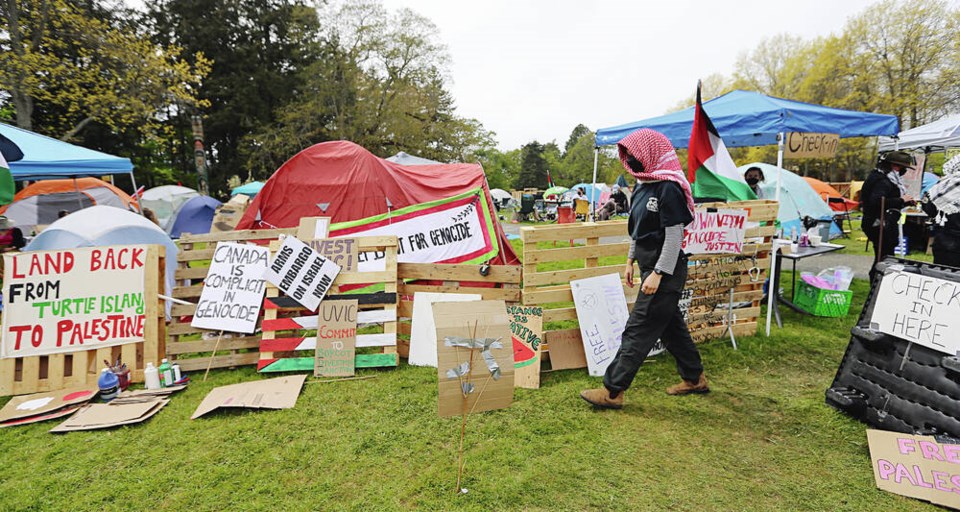The University of Victoria “cannot agree to demands or ultimatums from any group” but remains committed to open and constructive dialogue, university president Kevin Hall said in a statement in response to a protest encampment that was erected on campus.
He pushed back on “misinformation, speculation and interpretation on social media” related to the pro-Palestine encampment. “For example, there have been accusations that the university has set up surveillance cameras on the roof of the MacPherson Library — we have not,” Hall said.
He said that it’s true that members of the encampment have been assaulted and the person suspected of being the assailant “can be arrested by police if they return.”
Hall’s statement is the first public comment from a UVic university leader since the encampment was established on university grounds on May 1.
UVic tour guides for incoming summer semester students made no mention of the highly visible encampment during campus tours on Friday.
In recent days, the encampment has grown to about 50 tents encircled by pallets. It includes a garden, kitchen, library and bike shed.
UVic director of campus security Jess Maclean approached the encampment on Friday to inform protesters that UVic had received information of a possible counter-encampment or protest. No counterprotest had arisen as of Saturday evening.
Hall said encampment organizers have sent the university several demands, “including divestment from companies that contribute to and benefit from violence against Palestinians.”
The university’s investment policy is being reviewed and students from the encampment were invited to participate but “at this point they have refused.”
Protesters from the encampment met with two university representatives on Monday.
Deondre Smiles, a UVic geography professor who accompanied the protesters to that meeting, said it’s inaccurate to characterize the encampment as uninterested in dialogue.
“Students have been very articulate with the administration in the very limited engagement that the administration has made with them.”
A spokesperson for the encampment said on Friday that there has been no follow-up from the university since the Monday meeting.
Pierre-Luc Landry, a UVic professor with the French and Francophone studies department, said that Hall’s statement gave insufficient information about the encampment and was “brilliantly written” to position the university in a good light.
Landry, who supports the encampment, said it’s important to remember the power discrepancy between university students and administration. “Saying that the door is open doesn’t mean it really is, and it surely doesn’t mean that it is safe to enter the room,” he said in an interview conducted over text.
The encampment — which has followed similar encampments at dozens of university campuses in sa╣·╝╩┤½├Į and the U.S. — is happening because of the crisis in Gaza, Landry said. “We live in a moment where hope is so scarce, but nonetheless the students decided that they had to do something and take action.”
About 60 UVic faculty members have called on their faculty association to hold a meeting to formalize its stance on the encampment. Seven motions ranging from concerns about student rights, surveillance, support for Palestinian scholars and divestment are expected to be discussed.
>>> To comment on this article, write a letter to the editor: [email protected]



